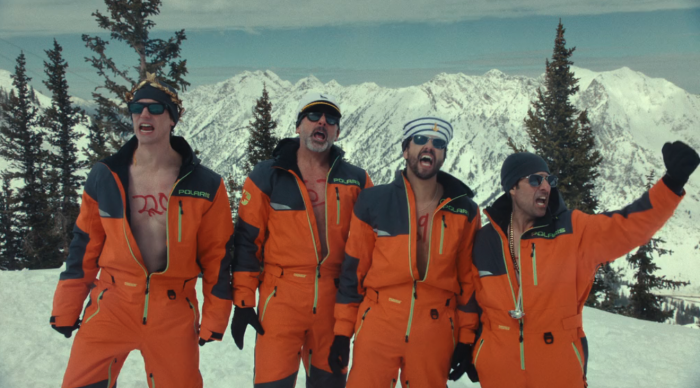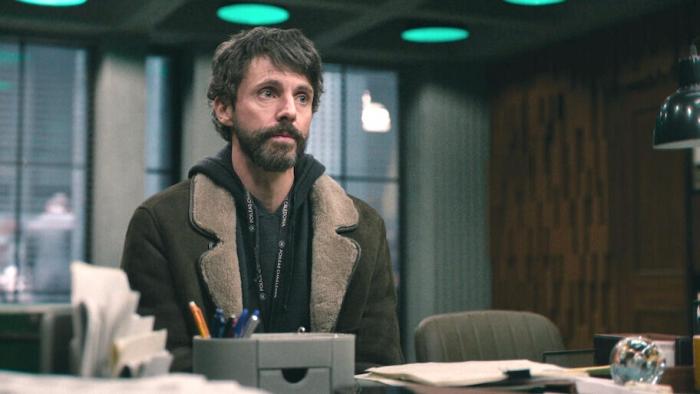
‘Mountainhead’ Review: Jesse Armstrong Speed Runs the End of Civilization for Laughs
By Tori Preston | Film | June 2, 2025

Jesse Armstrong is an absolute madman. He came off the end of the critically acclaimed Succession and apparently decided he had more to say about the ways ultra-rich people ruin everything, so he wrote a movie about it. Then he directed it himself as his feature film debut. He did all of that, the writing and the directing, in under six months. And here’s the kicker: it’s good.
With Mountainhead, Armstrong trades in his media moguls for technocrats and ups the stakes, with corporate mergers set against a ticking clock of a world on fire. I sort of imagine that Armstrong, like the rest of us, took a look at Alexander Skarsgård’s Lukas Matsson in Succession and thought, “I’d love to follow that guy for a day.” The result is a sharp comedy that offers little comfort about the state of the world or your place in it — other than the moral high ground, which you definitely have over these entitled pricks.
I’ll be honest, though. I was worried at first. Mountainhead takes its time putting all its cards on the table, and for a while it seemed like it might settle for being a richly depicted, albeit shallow, portrait of said pricks who get together for a weekend of booze and poker in the mountains — and that’s about as relatable as the setup gets before they’re howling their net worths to the skies. The titular Mountainhead is a new mountainside retreat built by “Souper” (Jason Schwartzman), so dubbed because he’s the poorest of the lot. He measures his wealth in the mere hundreds of millions and hopes his new meditation/lifestyle app will be his ticket into the billionaire’s club alongside his buddies. Ven (Cory Michael Smith) is the richest of the group, and the world at large, thanks to his successful social media app, Traam. Unfortunately, he just released new features to the platform that have resulted in a wave of deepfakes and misinformation, with no safeguards in place to prevent the real-world consequences. Jeff (Ramy Youssef), whose company Bilter is an AI product capable of fact-checking all of Traam’s garbage, sees his net worth nearly double in the wake of Ven’s misstep and the resulting global chaos he’s unleashed. Then there’s Randall (Steve Carell), the elder statesman of the group, a venture capitalist with a philosophical bent and a terminal cancer diagnosis he refuses to acknowledge.
Despite the rule of the getaway being “no deals,” all four men arrive at Mountainhead with an agenda. Ven needs to get Jeff to sell him Bilter before he’s forced to do the unthinkable (acknowledge Traam’s role in setting the world on fire). Randall needs someone to usher in a techno-utopian transhuman future in the next five years so he can upload his consciousness to the net and sidestep his mortality, and Ven is the most likely bet — especially if he’s got Bilter in his pocket. Souper just wants someone to invest in his app to the tune of a billion bucks or so, and Jeff … well, Jeff is mostly concerned about all the death and destruction in the news, and also about his partner flying off to a sex party without him. He definitely doesn’t want to sell Bilter, though.
I’ve written before about the ways Succession explored the lack of consequences amongst the wealthy. It was threaded into the very plot structure, with threats to the Roy family and their company seeming to fall by the wayside between episodes. With Mountainhead, Armstrong takes the question of consequence one step further by looking at the ways the rich behave when there is no accountability. When Ven very seriously asks Randall, “Do you believe in other people?” it’s clear that he hasn’t just broken humanity’s grasp on reality with his tech — reality has lost its grip on him, too. Instead of poker, these men drop buzzword-laden diatribes about the stock market and brainstorm casual South American coups, but it’s when they finally put their phones down and find conflict with each other that Armstrong’s comedy suddenly jumps to the next level. All their hubris, all their justifying how the end justifies the means, suddenly aimed inwardly at the “real” friends in front of them rather than toward those unbelievable “people” down below. How far will they go when they believe they’re capable of anything and nothing can touch them?
Not very far, it turns out. These men can set the world on fire, yet can’t boil an egg, and Mountainhead is at its best when it lays that dissonance out for our amusement. For all the ways the film hits too close to home — the very obvious Musk/Thiel/Zuckerberg influences, the dangers of misinformation — there’s something to be said about showing just how cowardly and ineffectual these titans really are when left to their own devices. It may not change a thing, but as Logan Roy would say, these are not serious people.



